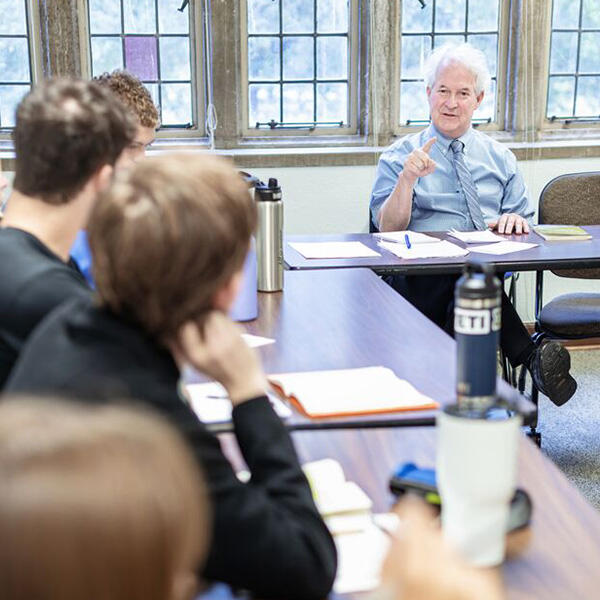The PPE program at Rhodes honored as a "Hidden Gem" by the American Council of Trustees and Alumni.
The Philosophy, Politics & Economics (PPE) program is designed to integrate three academic disciplines that were once considered interrelated elements of a comprehensive study of society and politics. Their essential contributions to understanding the principles and practice of a just and thriving political and social order were recognized by Plato and explored by, among many others, St. Thomas Aquinas, Adam Smith, Karl Marx, and more recently by John Rawls and Milton Friedman.
The intersections are evident in most political issues and problems. The organization of economic life raises philosophical questions about justice, liberty, and equality that the discipline of economics cannot, by itself, answer. Similarly, political life confronts both moral and practical questions concerning efficiency, equitable distribution of wealth, and the preconditions of sustainability and prosperity that political science cannot, by itself, answer. A comprehensive understanding can come only from studying all three disciplines.
Students are invited to join the PPE Club, which seeks to increase connections between current and prospective majors while also raising the profile of the major through social events such as meetings, speaker presentations, and social gatherings of majors and members of the PPE faculty.
The PPE program’s interdisciplinary curriculum offers various courses that cover: ground-breaking works that laid the foundations for political and economic systems throughout the world; major moral issues and theoretical arguments related to various types of political and economic organization; a solid foundation in contemporary economics; political economy from international and comparative perspectives; historical developments in economic and political organization; complex issues in particular public policy problems; and an introduction to methods of scholarly research. The central objective of the program is to engage majors--through lectures, seminars, and symposia—in rigorous and intellectually invigorating examinations of the competing practical and theoretical arguments and visions.
The development of intellect and skills: Our courses will train you in various modes of analytical thinking and writing, which are keystones of success in law school, graduate school, and the wide variety of careers our majors have pursued.
Foundation course credit: Between our required courses and electives, a PPE major can satisfy six of the College's general degree requirements (F2i, F3, F6, F8, F9, F11) and complete the third course of the F1 requirement.
The PPE curriculum: Our required courses cover, among other areas, basic and advanced principles of economics, economic history, modern political philosophy, contemporary moral, economic, and social issues, global dimensions of political economy, and methods of research. The electives allow majors to concentrate in a particular area, such as law, international politics and economics, ethics, economic theory and practice, and public policy.
*New PPE electives*: Ethics in Action (PHIL 228, 2 credits); participation in the Ethics Bowl competitions (PHIL 229, 2 credits). Take both and you will satisfy a foundation requirement (F11).
Some topics and issues we explore in our courses:
- Justifications for private property and its role in the economy and civil society
- The relationships between individual goods and common goods
- Disputes over the meaning of justice, equality, and liberty
- The ethical dimensions of public policy (e.g. health care, immigration, and redistribution of wealth)
- Comparisons of capitalist and socialist economies
- The intersection between politics and economics globally
- Historical developments in public policy and economic life





